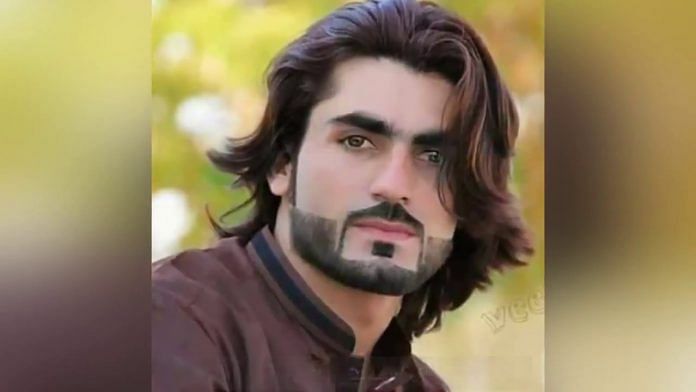Our TV offerings show the Pathan husband as the wife-beating patriarch; even projects commissioned to promote patriotism portray them as terrorists.
Last week, pictures of a stunning Pathan boy called Naqib, with his hair flying in the wind, were all over the Pakistani media, with outrage at his extra-judicial murder.
He had been shot in an encounter. He wanted to be a model, not a militant. But in these times of racial profiling, who has time for facts?
Early last year, a shocking circular was leaked on social media in which the Punjab Police was accused of racially profiling Pathans.
A week prior to this, I had overheard a conversation among my crew members in the car. A Punjabi-origin director was discussing a young Pathan street seller. He was describing how the boy had turned up in one of the posh sectors of Islamabad and appeared to be suspicious. His only crime, it emerged later, was that he was a Pathan who had apparently appeared from nowhere and was selling green tea and dried fruit.
I shook my head disapprovingly and made a mental note to revisit this issue with our crew.
I had barely had time to give them a lecture on their bigotry when this letter of Punjab Police from Mundi Bahuddin emerged. Initially, I believed it to be fake, but it was confirmed that a police station in Mundi Bahauddin, a city 45 minutes from the capital, had indeed issued this notification.
The language of the notification was almost identical to the conversation I had overheard.
I happened to be on my way to the site of the suicide blast in Tangi, Charsadda, in the Khyber Pakhtunkhwa province. As the young mother wept angry tears and repeatedly asked me why Pukhtun areas were not safe, despite their countless sacrifices in the war against terror, I felt embarrassed and voiced my anger on the issue.
I had witnessed bomb blasts while I was still in school in Peshawar in the 1980s.
Since the time of the Afghan war that former President Zia-ul-Haq led us into, we the Pathans have borne the brunt of terrorist activities.
Sharing a porous border with Afghanistan meant criminals perpetrating acts of violence could make an easy getaway.
Obviously, if you want to blend into a community, you would dress like the locals. This meant trained terrorists of various ethnicities would be donning our Pukhtun attire. Where is the logic in stigmatising the cultural attire of an entire region?
A few locals might be enticed into a life of crime that is not only glorified but pays handsomely since Pukhtun areas have long been deprived of employment opportunities and education.
This however, does not mean that every single individual in a community would choose to turn to crime.
After widespread condemnation from Pukhtun voices, the offending circular was quickly retracted and the matter quashed by ordering an inquiry into the discriminatory note.
However, only a week later, the local traders’ association issued its own circular, asking local businesses to report Pathan or Afghan-looking individuals.
The video footage of young, helpless Pathan men being dragged into the back of police vans hurt us even more.
The young proud father Naqib, who had wanted his son to join the armed forces, had been gunned down because of an alleged connection with Hakimullah Mehsud.
Naqib had recently set up a fabric shop in Karachi, and seemed interested in a modelling career, as was evident from his Facebook posts. In most of his pictures, he brandished no guns, instead choosing romantic images like a log fire with a tea kettle brewing away, and a child lovingly held up to the sky.
His good looks might have tugged at our heartstrings a tad more than usual since encounter killings are nothing new for Karachi.
Another reason perhaps for this news quickly being picked up from social media was the police officer at the heart of this incident. Rao Anwar had courted controversy before too.
Ironically, he had been a hero for the Pakistan Tehreek-e-Insaf in January 2015, when the party leader had strongly criticised the PPP government in Karachi for ordering the dismissal of Tanveer Rao.
In a moment of memory loss, typical of the PTI chairman, he also tweeted his anger at the shooting of Naqib by his once favourite SSP.
While our political leaders continue with their fickle loyalties, there seems to be a consistent policy of treating Pathans unfairly by the law-enforcing authorities and portraying them negatively in the media.
Not only do our popular TV offerings show the Pathan husband as the wife-beating patriarch, but even commissioned projects by the authorities to promote patriotism stigmatise Pathans by portraying them as terrorists.
While youth protesters in KP and FATA raised the issue of Naqib’s killing in an encounter, another faux pas was ready and waiting to ignite the issue further: a video of a man in traditional Pathan tribal wear being gunned down in an anti-terror exercise at Multan railway station.
I held my head in my hands in grief at the blatant insensitivity of the image. Given the emotional outpouring following Naqib’s death, this could not have come at a worse time.
We might not be able to prevent all terrorist attacks just yet, but we could at least refrain from demonising a race through our own media outlets. In Naqib’s case, a high-level inquiry has been ordered and the SSP stopped from leaving the country, but not every Pathan youngster has eye-catching FB posts or a controversial police officer at the centre of the story.
Is it not possible for a transparent judicial due process to be followed?
Reham Khan is a journalist, child rights activist and single parent in Pakistan.




Please stop spreading hatred. You r much better than that. For God sake.